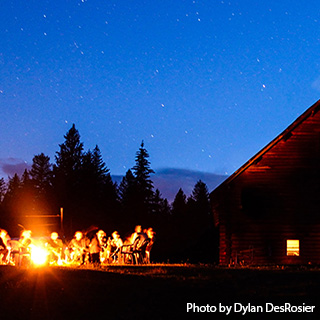Projects & Initiatives
Fish & Wildlife Management on Federal Lands
 The authority and responsibility for managing fish and wildlife on federal lands and in federally designated wilderness is often a source of controversy. Conflicts between federal and state governments in the management of wildlife on federal lands have intensified in recent years. Consider, for example, recent decisions by the National Park Service and Fish and Wildlife Service to preempt Alaska’s hunting regulations and predator control measures that were in conflict with National Park and Refuge laws (and the use of the Congressional Review Act to rescind one of these rules in March, 2017). Other examples include predator killing contests on lands managed by the U.S. Forest Service and Bureau of Land Management, wolf control in federally designated wilderness areas, and controversy surrounding hunting and trapping on private inholdings within Grand Teton National Park.
The authority and responsibility for managing fish and wildlife on federal lands and in federally designated wilderness is often a source of controversy. Conflicts between federal and state governments in the management of wildlife on federal lands have intensified in recent years. Consider, for example, recent decisions by the National Park Service and Fish and Wildlife Service to preempt Alaska’s hunting regulations and predator control measures that were in conflict with National Park and Refuge laws (and the use of the Congressional Review Act to rescind one of these rules in March, 2017). Other examples include predator killing contests on lands managed by the U.S. Forest Service and Bureau of Land Management, wolf control in federally designated wilderness areas, and controversy surrounding hunting and trapping on private inholdings within Grand Teton National Park.
Observing increasing conflict and confusion about the authority to manage wildlife on federal lands, the Bolle Center was asked to provide an authoritative review of the legal and policy context of wildlife management on federal lands with the objective of providing a more common understanding amongst federal and state agencies.
To that end, Director of the Bolle Center Martin Nie assembled a research team consisting of two additional academics (Sandra B. Zellmer, Professor of Law, University of Montana and Julie Joly, former Associate Professor of Resources Law and Policy at University of Alaska Fairbanks) and three consultants (all now retired) having decades of experience on federal public lands and wildlife management, working for the U.S. Department of Agriculture’s Office of the General Counsel (Kenneth Pitt), USFS (Jonathan Haber, a former planning specialist), and U.S. Department of Interior’s BLM (Christopher Barns, a former wilderness specialist at the Arthur Carhart National Wilderness Training Center).
The 135 pp. article (PDF version) was published in Environmental Law, Vol. 47, no. 4 (2017).
Director Martin Nie’s talk at Lewis and Clark Law School about the project and its relevance to the Secretary of Interior’s Memorandum (Sept. 10, 2018) on State Fish and Wildlife Authority on Department of Interior Lands and Waters is available as a Powerpoint pdf (To access narration/presenter’s notes please download the pdf and double-click box at upper left-hand corner).
We also developed a Frequently Asked Questions page designed for federal land managers.
A PDF of a Powerpoint presentation about the article is available (to access narration/presenter’s notes please download the pdf and double-click box at upper left-hand corner)
As presented to staff of the House Resources Committee of the U.S. Congress, the research is also summarized in this 3-page briefing paper (PDF).
Read invited Declaration of Martin Nie, focused on the research and its application on National Forest lands, in Utah Native Plant Society and Grand Canyon Trust v. U.S. Forest Service (10th Circuit Court of Appeals, 2017) (PDF)
Environmental Law published a rebuttal to our Article written by a representative of the Association of Fish and Wildlife Agencies to our Article. Our response to that rebuttal, requested by the Journal, is found here.
New Developments in the Transfer of Federal Lands Movement

Funded by a generous grant from the Wilburforce Foundation, the Bolle Center publishes a new report exploring recent Presidential actions that redefine and narrow the public part of public lands management. Reclaiming the National Interest in Federal Public Lands and Wildlife Conservation reviews the progressive roots of public lands and makes an affirmative case for why their management and conservation is in the national interest and why they have the potential to unify a divided nation. Report PDF.
In another piece, published by Ecology Law Currents, the Bolle Center traces new developments in the transfer of federal lands movement. The Article reviews congressional bills that do not transfer ownership of federal lands to the states or private interests, but rather give state and local governments control over federal lands and resources. In doing so, these bills radically alter the traditional paradigm of federal lands management and make federal law subservient to state authority. Nie and Kelly discuss the implications and explain what it means for the national interest in public lands.
